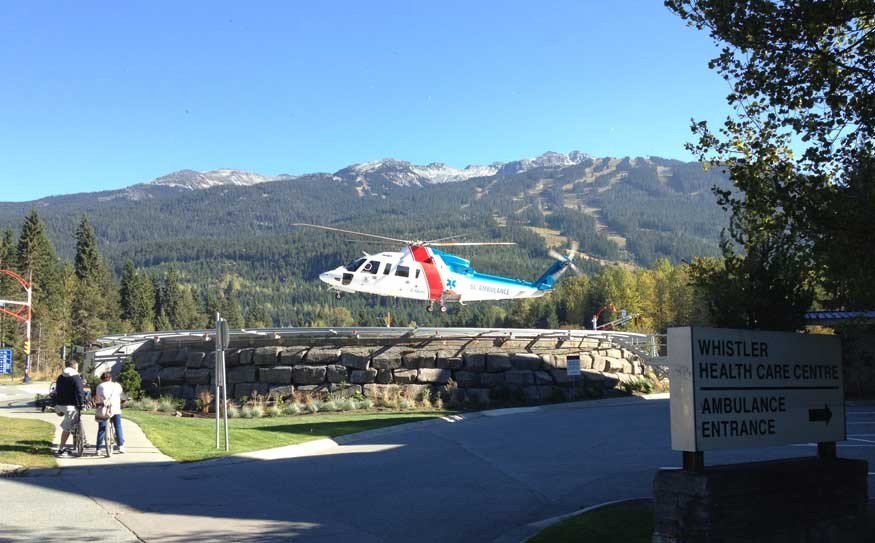The troubles for Whistler Health Care Centre's (VCH) helipad have flared up again, with Transport Canada saying it's considering suspending operations because vehicles and pedestrians have failed to observe traffic laws requiring them to stop while helicopters are landing or taking off.
The decision came following an audit the federal department made of the helipad's operations in mid-May.
"The helipad does remain open at the moment," said Clay Adams of Vancouver Coastal Health. "If we don't come up with an action plan by July 2 for Transport Canada to address the issue within that 90 days, which is roughly mid-August, they can issue a notice of suspension.
"Transport Canada identified a problem with people not obeying traffic signals. Part of what they identified was that a couple of the signals might not be as clearly visible as they were because of trees blooming."
A spokesperson for Transport Canada said the availability of suitable approach and departure paths leading to and from heliports were a major safety consideration.
"For the Whistler Health Care Centre, this means managing the traffic on the roads and sidewalks around the heliport to make sure that everyone is safe. The heliport operator is required to provide Transport Canada with an effective operational plan to manage the traffic and pedestrians," the spokesperson said in an email.
"Transport Canada is in contact with the Resort Municipality of Whistler, the local RCMP, BC Ambulance Service and Vancouver Coastal Health to assist in resolving this issue."
Adams expressed disappointment with this latest setback for the helipad.
"The ongoing frustration that we all have is to get this blasted thing working the way that everybody wants it to work and move on... This is certainly one of the most challenging situations we've had to deal with, getting this helipad running in a way that meets everybody's needs," he said. "A lot of it's on our end, a lot of it's been working with our partners and there's been lots of challenges. This is yet another one. But we've made the commitment (to fix it)."
Vancouver Coastal Health data estimates that the helipad is used around 75 times per year by incoming helicopters and 80 times per year by outgoing helicopters.
Adams said: "We're having some discussions with the RCMP and municipality around what we might all have to do to be able to stop people breaching the traffic signals. That's a tough one because obviously we need pedestrians and drivers to be conscious of signals and to recognize the request to stop for a helicopter landing the same way they would have to respect the request to stop for an emergency vehicle."
Adams said no incidents had occurred, but they had to anticipate potential problems.
"No one has been placed in danger. During the audit the Transport Canada people observed two vehicles that entered the helipad safety zone during a landing."
The vehicles were turning left from Lorimer Road to Blackcomb Way, Adams said. A boom gate might be needed to stop traffic, he added.
"Bottom line is, helicopters need to land and they need to land safely for the people in the aircraft itself and the people on the ground. Whether it is one helicopter a day or one every six months, we need to meet the expectations of safety," Adams said.
Whistler Mayor Nancy Wilhelm-Morden also expressed frustration, but said Vancouver Coastal Health was the lead agency.
"This is their issue, but of course it is a community issue as well because the helipad is important. We've been meeting with various service providers, of course, over the last several months in order to address the concerns Transport Canada has with the trees," Wilhelm Morden said.
"Then this issue came up. It's very frustrating."
She hoped the upcoming meetings would lead to a resolution.
"To the extent that we could do something (at the RMOW) we will."
Wilhelm-Morden said she had no firsthand knowledge of how often the signals to stop have been ignored by residents or visitors.
"I don't want to dismiss their concerns, they are well-grounded in safety issues and so on, but the helipad has been operating there for 25 years. Talk about shutting it down because there were two instances of vehicles or pedestrians not paying attention to lights is a little heavy-handed in my view," she said.
Dr. Bruce Mohr of the Whistler Health Care Centre said day-to-day operations at the centre had not been impacted so far.
"We would echo what VCH is saying. They're extremely frustrated at all this time and money they put into making a state-of-the-art helipad; they want to see it used. They have been advocating, along with the municipality, to get it elevated to accept single-engine aircraft, so they're really pushing for their use," Mohr said.
"Now to hear from the ministry that they might shut it down because of pedestrians or poor traffic control — in other words, even worse that the twin engine vs. single engine issue — that's horrible."
The centre staff and physicians are also keen to see it used.
"We want it to be safe obviously, but we want it to be used so we need to find a way around the ministry saying it's not safe because of pedestrians and traffic," Mohr said.
In April 2011 the helipad was closed completely for further upgrades to the landing pad, which cost more than expected and took longer than anticipated to complete. A $600,000 upgrade came in closer to $1 million, due in part to a decision by VCH to upgrade the de-icing system and other technical components.
There is a strong sentiment in the community that single-engine aircraft should also be allowed to land there as the majority of search and rescue is carried out by this type of helicopter.




